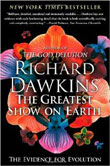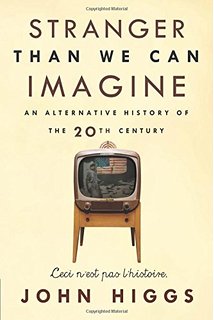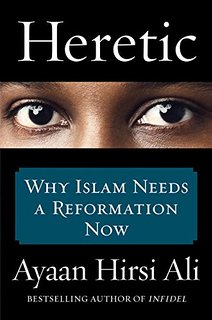Is Jordan Peterson Today’s Marshall McLuhan?
Brandon Sun, April 9, 2018 –
David McConkey
How does one grapple with the phenomenon of Jordan B. Peterson?
The Canadian psychology professor has a lot to say about how we
should live in the 21st century. He makes the news, he is all over
the internet, and he is drenched in controversy. He has a brand new
book, 12 Rules For Life: An Antidote to Chaos. And –
what grabbed my attention – he has been called today’s Marshall
McLuhan.
First the book. Peterson’s basic rules make good, common sense. Plus, he brings in insights from science, literature and other musings. I think, however, many readers may stumble on two features I found disconcerting. One is the darkness of his vision. The other is his emphasis on religion.
The rules are practical, like Rule 3: “Make friends with people who want the best for you.” Others are more intriguing, like Rule 12: “Pet a cat when you encounter one on the street.”
Some rules are even more fascinating than they first appear. Take Rule 1: “Stand up straight with your shoulders back.” Soon, Peterson is delivering a mini-lecture on evolutionary biology over the last few hundred million years. His main example? Lobsters. (You need to read it to get what I am taking about!)
Now, for what bothered me. Peterson’s major theme: we should become orderly and strong to meet the chaos of life’s challenges. Fair enough. But does he have to paint such a dark landscape for us to be challenged by?
The professor is extremely thoughtful and well-read. But many of his references are a running commentary on bleakness: Dostoevsky, Solzhenitsyn, Nietzsche. He makes constant references to the 20th century’s totalitarian dictatorships, wars and genocides.
Peterson can’t resist temptation. When he writes about environmentalists, he mentions the Columbine high school mass murderers. When he writes about motherhood, he reminds us that “Hitler’s mother gave birth to Hitler.”
I can’t help comparing Peterson’s to a book I reviewed here a few months ago: Timothy Snyder’s “On Tyranny.” Snyder also warns about possible new authoritarian regimes. Snyder also points to traits within us – as people and as societies – that can go very wrong. But somehow, Snyder’s analysis is more uplifting, more hopeful.
Then there’s Peterson’s preoccupation with religion. He incorporates the grand synthesis from his earlier book, Maps of Meaning: The Architecture of Belief. Peterson builds from ancient texts from the Middle East, India and elsewhere, like the Tao Te Ching.
But his main source is the Bible. Not surprising, he is drawn to the harsh God of the Old Testament. Especially the angry God who threw our first ancestors out of the Garden of Eden: condemning mankind to lives of endless suffering.
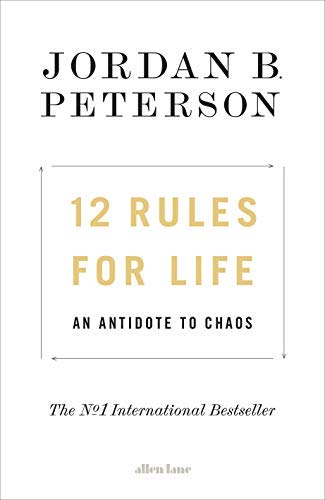 Peterson
insists he is telling universal stories, but he is vague about their
literal truth or divine origin. The Bible, he suggests, was written
“by no one and everyone.” His religious mixing and matching, I
think, will annoy many believers and non-believers alike.
Peterson
insists he is telling universal stories, but he is vague about their
literal truth or divine origin. The Bible, he suggests, was written
“by no one and everyone.” His religious mixing and matching, I
think, will annoy many believers and non-believers alike.
Now, what about the man and the phenomenon? Last fall, Peterson made big news at Wilfrid Laurier University in Waterloo, Ontario. And he wasn’t even there.
A Laurier teaching assistant showed her communications class a three-minute video clip of Peterson talking about gender and pronouns. The video was from TVOntario, the government-funded educational channel.
But the Laurier university administration compared the video by Peterson to “a speech by Hitler.” The administration accused the teaching assistant of creating “a toxic climate” in her classroom. (Laurier has since apologized for their accusations.)
Expect more news and more controversy. By wading into politically incorrect waters, Peterson says he is “surfing a 100-foot wave.” That can be dangerous! He appeals especially to young men. Peterson is like a “super-dad” for those who “never had good dads,” Canadian media critic Jesse Brown observes. “He’s Oprah for bros.”
And Peterson’s religious-oriented writings are well suited to the Trump era. Religious folks are the most enthusiastic supporters of U.S. President Donald Trump.
Peterson is an accessible academic. There is much on the Internet, including lectures that he posts online for free viewing.
In the global village, Peterson has put Canada on the map. Commentator Rex Murphy calls Peterson our “intellectual star,” in a league with past Canadian luminaries Northrop Frye and Marshall McLuhan. Interestingly, both of them also were professors at the University of Toronto, had comprehensive perspectives, and were deeply religious.
First the book. Peterson’s basic rules make good, common sense. Plus, he brings in insights from science, literature and other musings. I think, however, many readers may stumble on two features I found disconcerting. One is the darkness of his vision. The other is his emphasis on religion.
The rules are practical, like Rule 3: “Make friends with people who want the best for you.” Others are more intriguing, like Rule 12: “Pet a cat when you encounter one on the street.”
Some rules are even more fascinating than they first appear. Take Rule 1: “Stand up straight with your shoulders back.” Soon, Peterson is delivering a mini-lecture on evolutionary biology over the last few hundred million years. His main example? Lobsters. (You need to read it to get what I am taking about!)
Now, for what bothered me. Peterson’s major theme: we should become orderly and strong to meet the chaos of life’s challenges. Fair enough. But does he have to paint such a dark landscape for us to be challenged by?
The professor is extremely thoughtful and well-read. But many of his references are a running commentary on bleakness: Dostoevsky, Solzhenitsyn, Nietzsche. He makes constant references to the 20th century’s totalitarian dictatorships, wars and genocides.
Peterson can’t resist temptation. When he writes about environmentalists, he mentions the Columbine high school mass murderers. When he writes about motherhood, he reminds us that “Hitler’s mother gave birth to Hitler.”
I can’t help comparing Peterson’s to a book I reviewed here a few months ago: Timothy Snyder’s “On Tyranny.” Snyder also warns about possible new authoritarian regimes. Snyder also points to traits within us – as people and as societies – that can go very wrong. But somehow, Snyder’s analysis is more uplifting, more hopeful.
Then there’s Peterson’s preoccupation with religion. He incorporates the grand synthesis from his earlier book, Maps of Meaning: The Architecture of Belief. Peterson builds from ancient texts from the Middle East, India and elsewhere, like the Tao Te Ching.
But his main source is the Bible. Not surprising, he is drawn to the harsh God of the Old Testament. Especially the angry God who threw our first ancestors out of the Garden of Eden: condemning mankind to lives of endless suffering.
 Peterson
insists he is telling universal stories, but he is vague about their
literal truth or divine origin. The Bible, he suggests, was written
“by no one and everyone.” His religious mixing and matching, I
think, will annoy many believers and non-believers alike.
Peterson
insists he is telling universal stories, but he is vague about their
literal truth or divine origin. The Bible, he suggests, was written
“by no one and everyone.” His religious mixing and matching, I
think, will annoy many believers and non-believers alike.Now, what about the man and the phenomenon? Last fall, Peterson made big news at Wilfrid Laurier University in Waterloo, Ontario. And he wasn’t even there.
A Laurier teaching assistant showed her communications class a three-minute video clip of Peterson talking about gender and pronouns. The video was from TVOntario, the government-funded educational channel.
But the Laurier university administration compared the video by Peterson to “a speech by Hitler.” The administration accused the teaching assistant of creating “a toxic climate” in her classroom. (Laurier has since apologized for their accusations.)
Expect more news and more controversy. By wading into politically incorrect waters, Peterson says he is “surfing a 100-foot wave.” That can be dangerous! He appeals especially to young men. Peterson is like a “super-dad” for those who “never had good dads,” Canadian media critic Jesse Brown observes. “He’s Oprah for bros.”
And Peterson’s religious-oriented writings are well suited to the Trump era. Religious folks are the most enthusiastic supporters of U.S. President Donald Trump.
Peterson is an accessible academic. There is much on the Internet, including lectures that he posts online for free viewing.
In the global village, Peterson has put Canada on the map. Commentator Rex Murphy calls Peterson our “intellectual star,” in a league with past Canadian luminaries Northrop Frye and Marshall McLuhan. Interestingly, both of them also were professors at the University of Toronto, had comprehensive perspectives, and were deeply religious.
* *
* *
See also: The Medium is the Message?
How Do You be a Good Person?
More Than Ever, Words and Ideas Matter
So Many Reasons to Appreciate Podcasts
Cultural Interaction Can Have Positive Impact
Other Reviews
QUICK CONTACT:
David McConkey,
Brandon, Manitoba
Send me an email
My Sites / Interests
- Citizen Active
- Columns
- The Great War
- Live Well, Do Good
- Manitoba History
- Obituary Guide
- Reviews
- The War on Drugs
Some Reviewed Books:
The War on Drugs:
A Failed Experiment

The Atheist Muslim:
A Journey from Religion to Reason
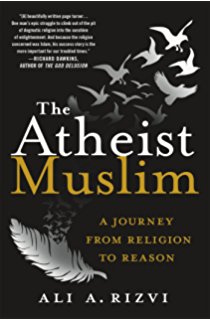
Stranger Than We Can Imagine:
An Alternative History of the 20th Century
Heretic:
Why Islam Needs a Reformation Now
Islam and the Future of Tolerance:
A Dialogue

Extraordinary Canadians:
Nellie McClung

The Greatest Show on Earth:
The Evidence for Evolution
